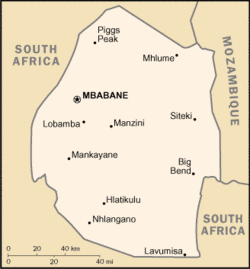Welcome to the Virtual Education Wiki ~ Open Education Wiki
Eswatini: Difference between revisions
No edit summary |
No edit summary |
||
| Line 24: | Line 24: | ||
== Swaziland | == Education in Swaziland == | ||
Education in Swaziland is now free at primary level mainly 1st and 2nd grades and also free for orphaned and vulnerable children but not compulsory. In 1996, the net primary school enrollment rate was 90.8%, with gender parity at the primary level. In 1998, 80.5% of children reached grade five. (1) Primary school attendance rates were unavailable for Swaziland as of 2001. In 1996, 91.3 percent of the teachers were certified to teach according to national standards, and the pupil to teacher ratio was 33:9. (2) | |||
== Swaziland education system == | == Swaziland education system == | ||
| Line 37: | Line 36: | ||
=== Universities in Swaziland === | === Universities in Swaziland === | ||
The University of Swaziland seems to be the only one. See http://www.uniswa.sz/ | The University of Swaziland provides higher education (1) and seems to be the only one. See http://www.uniswa.sz/ | ||
It has an Institute of Distance Education which has in October 2009 produced Issue 1 of an informative Newsletter - http://www.uniswa.sz/academic/distlearn/newsletter.pdf | It has an Institute of Distance Education which has in October 2009 produced Issue 1 of an informative Newsletter - http://www.uniswa.sz/academic/distlearn/newsletter.pdf | ||
| Line 65: | Line 64: | ||
=== Schools === | === Schools === | ||
The Ministry of Education pays teacher salaries, while student fees and money raised from the community pay for costs such as building upkeep and teacher housing. (2) | |||
=== Post-secondary === | === Post-secondary === | ||
| Line 93: | Line 94: | ||
== References == | == References == | ||
1. http://en.wikipedia.org/wiki/Swaziland#Education | |||
2. http://en.wikipedia.org/wiki/Education_in_Swaziland | |||
Revision as of 17:01, 27 July 2011
Partners situated in Swaziland
None.
Swaziland in a nutshell
(sourced from http://en.wikipedia.org/wiki/Swaziland)
Swaziland, the Kingdom of Swaziland (Umbuso weSwatini), sometimes called Ngwane, is a landlocked country in Southern Africa, bordered to the north, south, and west by South Africa, and to the east by Mozambique.

The nation, as well as its people, are named after the 19th century king Mswati II.
Its population is 1.18 million.
Its capital is Lobamba (royal capital) and Mbabane (administrative capital and the largest city).
Swaziland's economy is dominated by the service industry, manufacturing and agriculture. Some 75% of the population are employed in subsistence farming, and 60% of the population live on less than US$1.25 per day.
Swaziland's main trading partner is South Africa, and its currency is pegged to the South African rand.
Swaziland's economic growth and societal integrity has been highly endangered by an ongoing HIV epidemic.
Education in Swaziland
Education in Swaziland is now free at primary level mainly 1st and 2nd grades and also free for orphaned and vulnerable children but not compulsory. In 1996, the net primary school enrollment rate was 90.8%, with gender parity at the primary level. In 1998, 80.5% of children reached grade five. (1) Primary school attendance rates were unavailable for Swaziland as of 2001. In 1996, 91.3 percent of the teachers were certified to teach according to national standards, and the pupil to teacher ratio was 33:9. (2)
Swaziland education system
Higher education
Universities in Swaziland
The University of Swaziland provides higher education (1) and seems to be the only one. See http://www.uniswa.sz/
It has an Institute of Distance Education which has in October 2009 produced Issue 1 of an informative Newsletter - http://www.uniswa.sz/academic/distlearn/newsletter.pdf
The Institute will offer three new programmes:
- Certificate in Portuguese
- Bachelor of Education degree in Primary Education
- Bachelor of Education degree in Secondary Education
These are done in collaboration with the Eduardo Mondlane University in Maputo (Portuguese programme) - it is the oldest and largest university in Mozambique - and the staff of the University of Swaziland Faculty of Education (degrees in Education)
The Institute has also recently installed Moodle.
Polytechnics in Swaziland
Colleges in Swaziland
Education reform
Schools
Post-secondary
Administration and finance
Schools
The Ministry of Education pays teacher salaries, while student fees and money raised from the community pay for costs such as building upkeep and teacher housing. (2)
Post-secondary
Quality assurance
Schools
Post-secondary
Information society
ICT in education initiatives
Virtual initiatives in schools
Virtual initiatives in post-secondary education
Lessons learnt
References
1. http://en.wikipedia.org/wiki/Swaziland#Education
2. http://en.wikipedia.org/wiki/Education_in_Swaziland